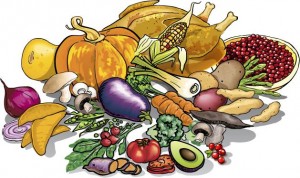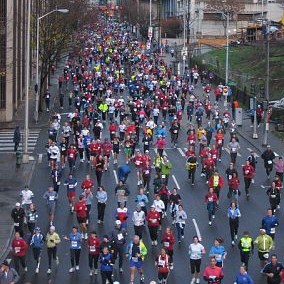 Over-stuff yourself on Thanksgiving but got a marathon or other endurance event coming up this weekend? Don’t pull back and try to compensate for your day of indulgence. You can’t afford to create an energy (calorie) deficit just days before an endurance event. Eating too little in the days prior to an event can hinder your performance on event day. By restricting your intake you risk depleting your glycogen stores and jeopardizing your athletic performance. A better strategy is to eat smarter not less.
Over-stuff yourself on Thanksgiving but got a marathon or other endurance event coming up this weekend? Don’t pull back and try to compensate for your day of indulgence. You can’t afford to create an energy (calorie) deficit just days before an endurance event. Eating too little in the days prior to an event can hinder your performance on event day. By restricting your intake you risk depleting your glycogen stores and jeopardizing your athletic performance. A better strategy is to eat smarter not less.
Most endurance athletes know that carbohydrates are their best friend. Carbs are the preferred fuel for exercise, and are necessary not only for peak performance but also to prevent “bonking”. During exercise our bodies have 2 primary sources of carbohydrates (i.e. fuel): 1) carbohydrates provided by the food we eat or have recently eaten, and 2) carbohydrates stored in our muscles and liver in the form of glycogen. When glycogen stores are depleted, we “bonk” and performance drops dramatically.
To prevent bonking and to optimize athletic performance, we need to store as much glycogen as possible in our muscles. While this should be part of the on going nutrition strategy for endurance athletes, in the days prior to an event we try to “super load” our glycogen stores. This is often referred to as ‘carb loading’. What many endurance athletes fail to realize is that true “carb loading” involves more that a pasta dinner the night before an event. True carb loading starts about a week before the event. The first step is to reduce glycogen stores by exercising without fully replenishing carbohydrates. Typically a workout of 90 minutes or more about a week prior to the event gets this process started. The next 2-3 days consist of moderate intensity workouts or about 40 minutes each with low to moderate carbohydrate consumption on these days (~5 gm carbohydrate per kg body wt). Then finally, we start the carb loading with about 3 days of little or no exercise (0-20 minutes low intensity exercise/day) and a HIGH carb intake (~10 gm carbohydrate/kg body wt).
These last few days can feel like “carb stuffing” rather than carb loading because of the high volume of carbohydrate intake involved. I find it helps to consciously decrease dietary fat intake on these days in order to make room for more carbohydrate foods. Good sources of carbohydrate include breads, rice, oatmeal, cereal, and other grains; fruits, fruit juices & sorbet, milk & yogurt, and starchy vegetables such as potatoes, peas and winter squash. Adding some sweets to the diet at this time can actually help with carb loading too… as long as they are in addition too – not instead of – healthier whole foods. My personal favorite for carb loading is fruit smoothies. I can pack a lot of carbs into these using fresh & frozen fruit, yogurt, and juice. Snacking on dried fruits and drinking juices or flavored milk can also help to reach carbohydrate goals during carb loading phase.
Post-Thanksgiving carb loading can involve some seasonal favorites as well. Consider the following as good carb sources:
- mashed potatoes
- sweet potatoes or yams (candied is OK)
- cranberry sauce
- dried cranberries
- pie!
- low fat eggnog (skip the alcohol)
- apple cider (cold or hot spiced)
- hot chocolate
- peppermint mocha
- hot spiced cranberry juice
- rolls/ breads
- a few spoonfuls of pumpkin puree, some pumpkin pie spice and dried cranberries added to your hot breakfast cereal.
 While many athletes think they need to train up to the last day, it is actually more beneficial to provide the body with rest the few days prior to an event. If you are not trained by this time, a few more days is not going to help. More importantly, in order to maximize glycogen storage (carbohydrate loading) we need to stop using the glycogen we already have stored and allow the body to store more. This can only be done by minimizing our energy out-put… which means limiting exercise in the few days prior to an event.
While many athletes think they need to train up to the last day, it is actually more beneficial to provide the body with rest the few days prior to an event. If you are not trained by this time, a few more days is not going to help. More importantly, in order to maximize glycogen storage (carbohydrate loading) we need to stop using the glycogen we already have stored and allow the body to store more. This can only be done by minimizing our energy out-put… which means limiting exercise in the few days prior to an event.
Be aware that glycogen is relatively heavy but is fuel in the tank. Affective carb loading typically results in a few additional pounds on the scale, so don’t be alarmed. However, these are not pounds that will slow you down; they are actually extra fuel that will keep you going longer and stronger. Even with this extra fuel on board, it is important to consume carbohydrates during your event to keep your glycogen stores from draining too quickly. Drinking sports drinks that contain carbohydrates and/or eating carbs in the form of food or sports gels, bars, etc. will help you to keep going and finish strong.

